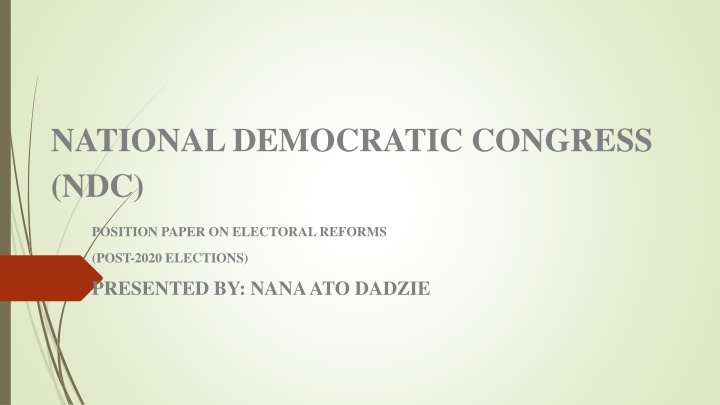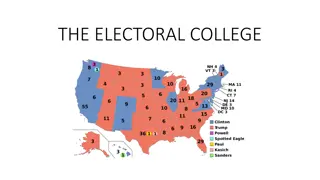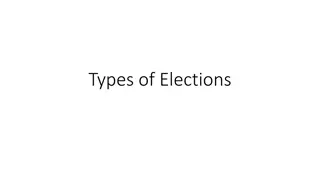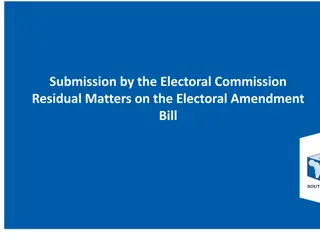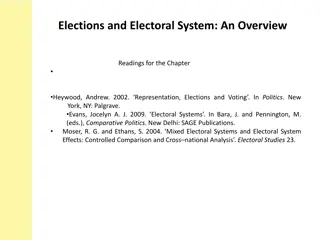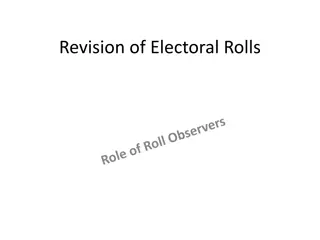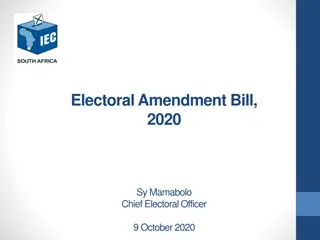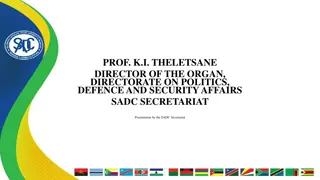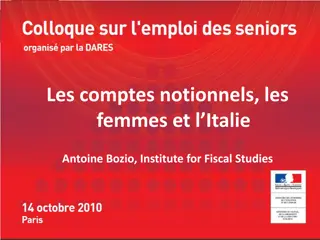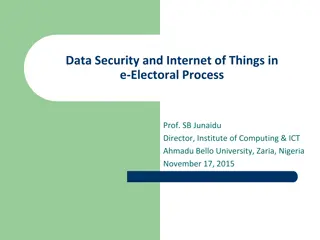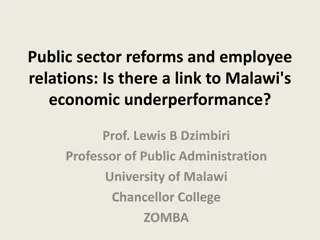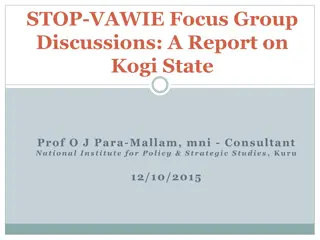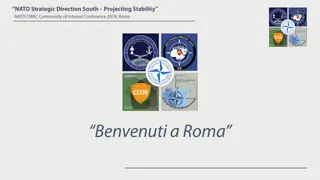NDC Position Paper on Electoral Reforms Post-2020 Elections
National Democratic Congress (NDC) presents key recommendations for electoral reforms post the 2020 elections. Recommendations include transparency in recruitment of temporary staff, providing final voter register to parties, and ensuring non-partisan recruitment of election officials. Justifications emphasize trust-building, transparency, and impartiality for free and fair elections.
Download Presentation

Please find below an Image/Link to download the presentation.
The content on the website is provided AS IS for your information and personal use only. It may not be sold, licensed, or shared on other websites without obtaining consent from the author.If you encounter any issues during the download, it is possible that the publisher has removed the file from their server.
You are allowed to download the files provided on this website for personal or commercial use, subject to the condition that they are used lawfully. All files are the property of their respective owners.
The content on the website is provided AS IS for your information and personal use only. It may not be sold, licensed, or shared on other websites without obtaining consent from the author.
E N D
Presentation Transcript
NATIONAL DEMOCRATIC CONGRESS (NDC) POSITION PAPER ON ELECTORAL REFORMS (POST-2020 ELECTIONS) PRESENTED BY: NANA ATO DADZIE
PART B REFORMS REQUIRING ACTION BY THE ELECTORAL COMMISSION
Recommendation 14 The mandatory requirement for the publication of applicants for recruitment as temporary EC staff for registration of voters and for elections and for allowing the public to object to applicants who have questionable backgrounds or have overt partisan biases must be strictly complied with. The requirement for the list to be posted at the District EC offices to which the applications relate must also be complied with...
Justification Prior to 2020, the list of temporary staff was advertised and exhibited and persons who had misgivings against any of them were allowed to object. This was missing in 2020. It must be re-introduced in order to bring trust in the electoral process and ensure transparency and removal of suspicion of bias on the part of the EC.
Recommendation 15 The EC should comply with the requirement for each political party participating in an election to be provided with a copy of the final voters register.
Justification In order for political parties to be effective in canvassing for votes and monitoring elections, they require advance copies of the register long before Election Day. The EC should be compelled to comply with the law and provide the final certified register to all participating political parties within the stipulated time period.
Recommendation 16 The EC should make sure that recruitment for the various categories of election officials is made as non-partisan as possible. The available positions should be advertised and non- partisan and competent persons selected after interviews. The selected persons should then be given appropriate training.
Justification Partisanship is the bane of free, fair and credible elections. It is therefore imperative to ensure that election officials are as unbiased and non-partisan as possible. Also in the face of increasing use of technology in registration and election processes, there is the need to use competent personnel who can understand the processes, fill the appropriate forms, do the necessary calculations and operate the machines in order to ensure credible elections and acceptable election results.
Recommendation 17 The EC should give wider publicity to the annual calendar of its activities and events at the beginning of an election year that it publishes and ensure that all participating political parties are aware of it.
Justification Advance knowledge of the programme for the election year will ensure a more effective participation of the political parties and other stakeholders. The calendar will compel the government to plan and provide the resources required on time and in accordance with the calendar of activities. It will enable political parties and other stakeholders such as the media, election observers and CSOs to plan their own programmes in the activities of the EC that concern them. For example, when the political parties know in advance the periods for the registration of voters, exhibition of voters register and filing of nominations, they can better prepare for those critical activities. This recommendation was first made by the EC s Electoral Reforms Committee in 2015, adopted by the IPAC and accepted by the EC.
Recommendation 18 The EC must ensure that printing houses entrusted with the printing of election materials have equipment that can print pink sheets with duplicates that can contain all the names of the candidates on one sheet when written upon.
Justification A single original pink sheet generating copies containing the names of all the candidates will easily resolve this problem.
ELECTION REFORM PROPOSALS Proposed Statutory Changes
Recommendation 19 The list of all polling stations to be used for an election with their names, code numbers and locations should be published in the Gazette and as supplements in the state newspapers not later than 30 days to the election. This will require an amendment to the Public Elections Regulations, 2020, C.I. 127.
Justification If accepted, this recommendation will deepen the transparency of the electoral process and help to prevent possible abuses at obscure polling stations. Since the time limit for the creation of polling stations is 42 days, a 30-day period for the notification of the public, the political parties and the candidates is considered reasonable. This recommendation was first made by the EC s Electoral Reforms Committee in 2015, adopted by the IPAC and accepted by the EC.
Recommendation 20 Currently, the statement of the Poll and the Declaration of Results Form are serially numbered and each Form is traceable to a particular polling station in a constituency. It is recommended that the EC should print replacement Statement of the Poll Form and Declaration of Results Form in a colour different from the original ones in order to distinguish them. Where a replacement Declaration of Results Form is used, the original Statement of Declaration Form should be attached to it.
Justification This will guarantee the authenticity of the Pink Sheets and serve as a security measure to prevent the possibility of replacing the true Declaration Form of a polling station with a forged one. It will help keep track of the original Pink Sheets which are issued to polling stations and help distinguish the replacement sheets from the original ones to facilitate an accurate account of the sheets.
Recommendation 21 The BVD printouts for each polling centre should be given to each political party agent or candidate s agent and should be posted at the polling station.
Justification This will allow for more transparency and ease of adjudication in case of disputes.
Recommendation 22 The Regional Collation Centre should be abolished. This requires an amendment to C.I. 127.
Justification The introduction of this additional bureaucratic layer in the collation process only introduced an element of opaqueness into the collation process and ended up as a veritable engine of electoral fraud.
Part B Proposed Administrative/Operational/Implementation Changes
Recommendation 23 Parliament should be given enough time and afforded ample opportunity to closely peruse and scrutinize all proposed C.I.s for registration of voters and election purposes and the Subsidiary Legislation Committee especially enabled to object to any provisions where necessary.
Justification This recommendation will safeguard the integrity of the electoral process and put paid to perceptions of incompetence and bias on the part of the EC.
Recommendation 24 The Statement of Poll and Declaration of Results Forms should be re-designed and simplified.
Justification This recommendation will facilitate efficient recording of polling information and verification of election results and expedite dispute resolution. This recommendation was first made by the EC s Electoral Reforms Committee in 2015, adopted by the IPAC and accepted by the EC.
Recommendation 25 The voting period of 7a.m. to 5p.m. on Election Day must be maintained.
Justification The argument that the change in the period will allow the counting and collation of the votes to be done during daylight and therefore reduce the incidents of violence is a non-starter because the counting and collation of results take no less that a minimum of 5 hours to complete and therefore will still be done partly in darkness if the change is effected; The EC must ensure that appropriate arrangements for lighting are put in place to allow for night-time counting of votes and collation of results. A very large percentage of the voters are farmers and fishermen and would rather take advantage of the cool mornings to go to their farms and to sea and come and vote in the afternoons which is usually after 3p.m. Ending voting at 3p.m. is a sure way of disenfranchising them. In the riverine and lake areas where voters have to use pontoons and tractors and aboboyaas to get to their polling stations, arriving there sometimes around 4p.m, closing voting at 3p.m. will also be a way of disenfranchising them as well. Increasing the number of polling stations in order to cut down the number of voters per polling station and thereby enable voting to end earlier will mean compelling the political parties and candidates to incur extra cost of recruiting party agents, training them and providing for their meals and allowances on Election Day.
Recommendation 26 The EC should stipulate clear procedures for presiding and returning officers on how to proceed in case of any irregularities occurring during the counting and collation process such as over-voting, non-matching reconciliation and mistakes in the results forms.
Justification This recommendation will make for better accuracy of the declared results, reduce election disputes and ensure more transparency.
Recommendation 27 The EC should reduce the number of extra ballot papers supplied to polling stations for spoilage and include smaller booklets containing 20, 15 and 10 sheets so that smaller numbers of extra ballot papers can be given out.
Justification This will guarantee the integrity of the polls and plug the loophole created by that particular supply of ballot papers to cater for spoilage. phenomenon of over- This recommendation was first made by the EC s Electoral Reforms Committee in 2015, adopted by the IPAC and accepted by the EC.
Recommendation 28 The regulation that persons with disability (PWDs) must be allowed to vote with the assistance of persons of their choice must be strictly enforced.
Justification This recommendation is to ensure that the vote of the PWD reflects the actual choice of the PWD.
POST-ELECTION REFORM PROPOSALS Proposed Statutory Changes
Recommendation 29 The EC should establish by C.I. administrative dispute resolution mechanisms for first instance grievances against decisions and actions of election officials. In particular, an Elections Adjudication Committee (EAC) should be established at the Head Office of the EC to review disputed Presidential election results prior to the EC s publication of the final declaration of the Presidential election results and the gazetting of same. The EAC should comprise officials of the EC, representatives of the political parties and agents of independent candidates that participated in the Presidential elections and stakeholder CSOs. The EC should constitute EACs with similar composition at the constituency level to administratively resolve grievances against decisions and actions of election officials at the constituency level. No court action challenging the election results should commence prior to the completion of the work of the EACs at the various levels
Justification This is consistent with the growing trend towards alternative dispute resolution, saves time and saves expense. It will also reduce over-reliance on the court process and lessen the pressure on the election calendar.
Recommendation 30 Party agents must be enabled by regulations to oversee the transmission of collated results at all the various stages of the collation process and at both ends of the results transmission. Such transmitted collated results must be confirmed and validated by the party agents at the receiving end to be acceptable.
Justification This is to ensure transparency and acceptability of the declared results.
Recommendation 31 The C.I. that regulates the elections should require the EC to publish details of all election results on polling station by polling station and constituency by constituency basis on its website and in the Gazette, as well as detailed results from all levels of collation, well before the deadline for filing petitions against the results. This will, in the case of Presidential elections, mean overturning by legislation the Supreme Court decision in Mettle-Nunoo & Others v. Electoral Commission [2007-2008] 2 SCGLR 1250 where it was held that the publication of a polling station by polling station results was not necessary for the declaration of Presidential election results to be valid. It will therefore require an amendment toArticle 63 (9) of the Constitution.
Justification There have been occasions where there have been discrepancies between what was declared as the total votes and what the collation actually provided. In one instance, that collation took a long time to complete by which time the period within which to petition had lapsed. It is therefore important for official record of polling station by polling station results to be published for cross-checking of the collation. That way, unnecessary litigation can be avoided and transparency and acceptability of the election results can be promoted. The necessary evidence can also be gathered for the filing of election petitions. This recommendation was first made by the EC s Electoral Reforms Committee in 2015, adopted by the IPAC and accepted by the EC.
POST-ELECTION REFORM PROPOSALS Proposed Administrative/Operational/Implementation Changes
Recommendation 32 The regulation requiring that the Returning Officer at the constituency collation centre should summary of results sheets of the constituency to the candidates or their representatives should be strictly complied with. give a copy of the
Justification This recommendation will enable the candidate or his or her agents to study the collated results to ascertain the accuracy of the results and be able to challenge the collation in good time if there are grounds.
Recommendation 33 Electoral officials who breach the rules should be sanctioned. The EC itself should also be sanctioned for non-compliance with its legal obligations, including applicable rules and regulations.
Justification It is actually an offence for election officials to breach regulations but it is the enforcement that is lacking. However, punishing election offenders will promote their diligence and deter others from doing the same. This recommendation was first made by the EC s Electoral Reforms Committee in 2015, adopted by the IPAC and accepted by the EC.
Recommendation 34 There must be a public broadcast of the Presidential vote collation process at the EC Head Office as and when the constituency Presidential results are received.
Justification This recommendation, if adopted, will enhance transparency and fairness of the collation process and enable citizens to view the trend of the collation and allow them to know how their favourite candidates are performing. This will allay any rumours, speculations and unfounded allegations which contribute to unnecessary tension in the country before and after the declaration of the results. This will also demystify the Presidential votes collation process in the interest of accountability, transparency and fairness.
Notes, Memoranda and Documentation The discussions of the NDC Electoral Reforms Committee that prepared the above proposals were supplemented by inputs from the following Notes, Memoranda and Documentation: 1. Ametor-Quarmyne Eric: Suggestions for consideration for Electoral Reform, 13thMay 2021 2. Dadzie Nana Ato & Ahwoi Kwamena Professor: Presentation on Electoral Reforms at NDC NEC Retreat at Volta Serene Hotel, Ho, 16-18April, 2021 3. Director, Research, Monitoring and Evaluation Department, Electoral Commission: Report on the Inspection of the Offices of Registered Political Parties (2006) 4. Electoral Commission, Ghana: A Guide to Candidates and their Agents Presidential and Parliamentary Elections (2016) 5. Electoral Commission: Guidelines for Continuous Voter Registration 6. Electoral Commission: Report of the Electoral Reform Committee submitted to the Electoral Commission of the Republic of Ghana datedApril, 2015 7. Electoral Commission of Ghana: Report on the Inspection of Offices of Registered Political Parties 2013
Notes, Memoranda and Documentation 1. EU EOM: Ghana Presidential and Parliamentary Elections 2016 2. European Union Election Observation Mission: Ghana 2020 Final Report Presidential and Parliamentary Elections 7 December 2020 3. Gyampo Ransford Edward Van Professor (Department of Political Science, University of Ghana, Legon, Ghana)/Agbevade Akpeko (Department of Political Science, University of Ghana, Legon, Ghana)/Graham Emmanuel (Department of Politics, York University, Toronto, Canada): Election Petition and the Future of Electoral Reforms in Ghana 4. Gyampo Ransford Professor (University of Ghana, Department of Political Science & Research Fellow, IEA): The State of Electoral Reforms in Ghana 5. IPAC: Communique issued at the end of a Two (2)-Day Review Workshop on the 2020 Presidential and Parliamentary Elections of Ghana, 18th-19thMay 2021, at theAlisa Hotel,Accra 6. Serwah-Asamoah Barbara: Electoral Reforms for Post-Election 2020-Gaps and Challenges (A Memorandum to the Committee), 20thMay 2021.
